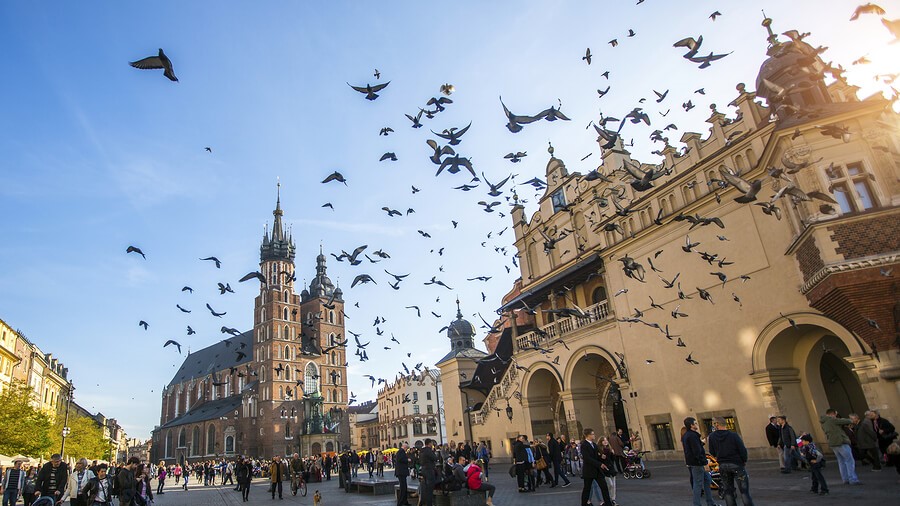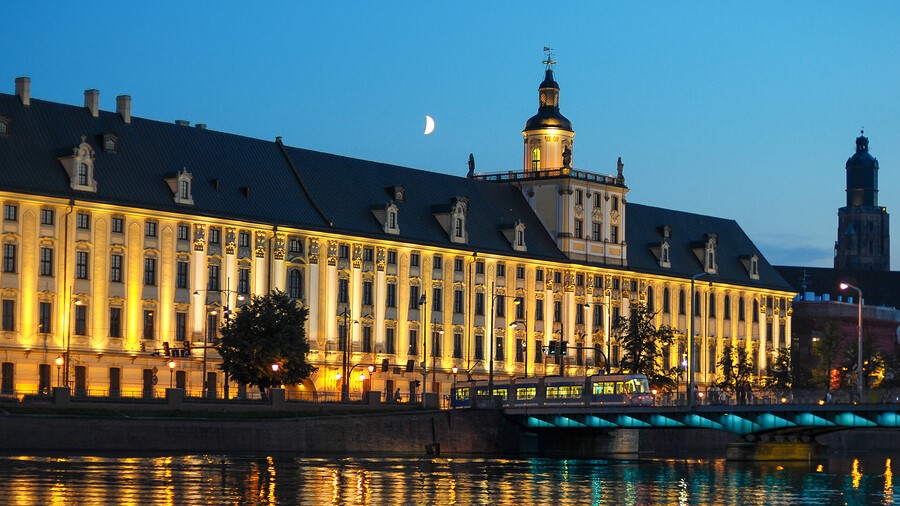The word ‘Poland’ might bring to mind cold weather, or perhaps cold cuts of meat. But for increasing numbers of people, Poland is becoming an attractive, affordable option for working and studying abroad. In 2015, Poland hosted over 57,000 international pupils from all over the world, an increase of 10,000 from the year before, and a massive 48,000 more than in 2005. These students are coming from Europe, particularly Scandinavia, Eastern Europe and Russia, but Poland is steadily receiving more international students from places like the US and UK.
Why? Well, though it often goes unsaid, Poland has some old and prestigious universities – 6 of its universities are in the QS World Ranking 2016-2017, and 11 are in the Top 100 for QS Emerging Europe and Central Asia rankings. Oh, and fees are rarely more than 4,000 USD per year – a big saving compared to other European countries.

Location
Poland is situated just inside the area known as Eastern Europe, bordering Germany on one side and Lithuania, Belarus and Ukraine on the other. It is a relatively big country that spans from Baltic coastline in the north to lakes, forests, Carpathian Mountains and even a bit of desert in the south (yes – there are deserts in Europe!). The climate can be as diverse as the landscape, from 30C in the summer to -6C in the winter in some regions.
Unique Benefits
Academic heritage. Poland has a long academic tradition, from the founding of 14th century Jagiellonian University in Krakow (which has Popes and Kings amongst its alumni) to creating the world’s first state ministry for education.
Courses taught in English, French, German and Polish. Over 50% of Poles speak English, making living and studying in Poland particularly accessible to foreign students. French and German speakers can also find courses in their native tongue, too.
Value for money. Polish university tuition is considerably lower than other study destinations, even for medical school. Check out the Fees and Scholarships section.
European cities. Poland’s cities have a vibrant mix of Jewish, German, Austrian, Czech and other cultures, making it a fascinating place to study. They also have typical European features, like highly efficient public transport and regular art, food and film festivals. They even have a festival just for students called Juwenalia, giving students three days off school along with parades, music and, of course, beer.

Student Life
The Polish take higher education seriously, and so students in Poland often have full timetables and work hard. However, Polish degrees are also much like the American system, and offer the opportunity to study more than one subject; you can specialise in certain areas but will get a general education too.
It’s a great environment for those who love to learn and to debate; the Poles have something of a reputation for fearlessly discussing politics, religion and other ‘taboo’ topics. Outside of university, though, student life in Poland is social, with plenty of nightlife and things to do in its student cities. Students in Poland often stay in university accommodation with other people, but some also stay in private apartments.
The Application Process
Applicants to study in Poland need to ensure they meet the entry requirements for each course they’d like to apply to by visiting the university’s website. Then, they must contact the admissions office at each university directly to send their applications. There is usually an admission fee, and you will need to prove your English proficiency, academic grades and a medical certificate. If you are from outside the EU/EEA you will also need to prove you have the financial means to support your degree. The academic year begins in October, so make sure you leave enough time to complete your application by the university’s deadline, along with a visa application if you need one. Depending on the country you are from, you may also need a ‘Stay Card’ – a temporary residence permit that allows you to live in Poland.

Unlike native Polish students, international students in Poland have to pay tuition fees – depending on the institution and the course you choose, your fees could be 2000-5000 EUR per year. Compared with the UK and USA, this is a big saving. Living costs for students, even in the centre of Krakow or Warsaw, are also lower than other European countries at roughly 280 EUR per week, or 1200 PLN, including accommodation. In fact, Warsaw is a cheaper place to live than many Eastern European cities, including Prague, Bratislava and Tallinn according to Mercer’s Cost of Living Ranking.
As for scholarships and financial aid, there are several avenues you can take: studying within the Erasmus+ scheme is one option; for students from Norway, Lichtenstein and Ireland, there’s the Polish Scholarship and Training Fund, and for Lithuanians the Polish-Lithuanian Youth Exchange Fund. If you can prove you are of Polish origin, you can also get a reduction on your fees. Students from everywhere else can apply for the Polish Government Scholarship, or research the scholarships provided by individual universities.
For extra cash, international students can work in Poland while studying. If you are from the EU you can get part-time work all year round without applying for a permit. For non-EU students, you are elligble to work during July, August and September, or try obtaining a work permit for jobs that continue all year.
After Graduation
It’s very common in Poland to go on to do postgraduate study, with as many as 80% of students choosing to stay to do a Master’s or PhD. However, if that isn’t for you, there are also some options to work in Poland after graduation. The ‘Stay Card’ that some students will need to study in Poland can be extended to allow graduates to continue living and working in Poland long enough to find work. Graduates from full-time courses at a Polish institution can apply for one of these.
This is particularly good news if you want to work in science or technology, as more multinational companies like Microsoft, Intel, GlaxoSmithKline and Google set up bases in Poland. But if you don't want to stay in Poland, you’ll still have a thorough European education that will prepare to for a career in any English-speaking country.